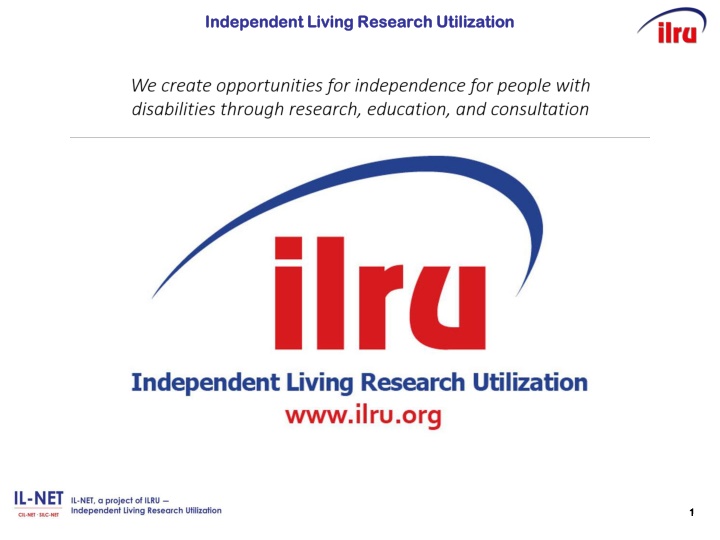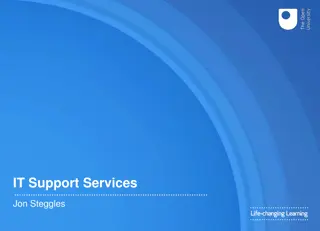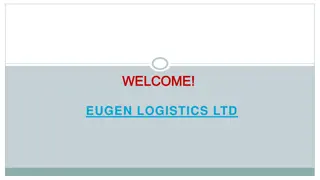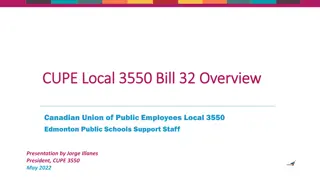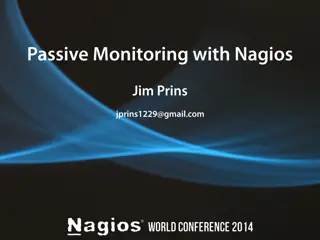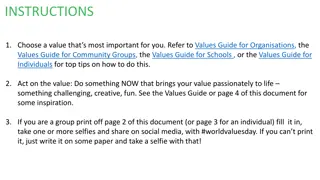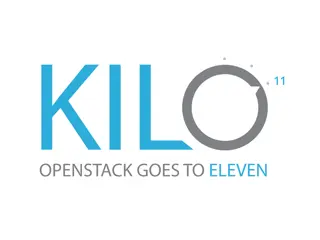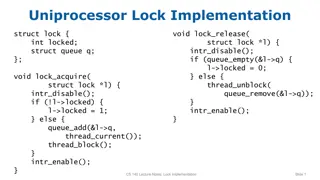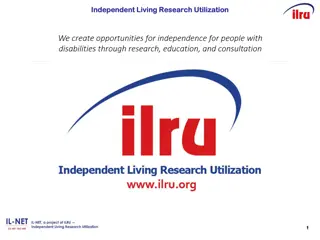Peer Mentor Program in Independent Living Research
Integrating CIL Core Services for a Holistic Consumer Experience includes implementing or strengthening effective core services in peer support through examples like Ability360's program. The definition of a volunteer peer mentor program is explained, highlighting its importance in providing role models and coaches for individuals with disabilities. Statistics from a 2008 survey show the prevalence and challenges of organized peer mentor programs in Independent Living Centers. Peer mentoring is crucial in the IL movement, empowering individuals to achieve independence. The inception and benefits of Ability360's Peer Mentor Program are also discussed.
Download Presentation

Please find below an Image/Link to download the presentation.
The content on the website is provided AS IS for your information and personal use only. It may not be sold, licensed, or shared on other websites without obtaining consent from the author.If you encounter any issues during the download, it is possible that the publisher has removed the file from their server.
You are allowed to download the files provided on this website for personal or commercial use, subject to the condition that they are used lawfully. All files are the property of their respective owners.
The content on the website is provided AS IS for your information and personal use only. It may not be sold, licensed, or shared on other websites without obtaining consent from the author.
E N D
Presentation Transcript
Independent Living Research Utilization Independent Living Research Utilization 1 1
Get to the Core of It: Get to the Core of It: Integrating CIL Core Services for a Integrating CIL Core Services for a Holistic Consumer Experience Holistic Consumer Experience Implementing or Strengthening Effective Core Services in Implementing or Strengthening Effective Core Services in Peer Support : Ability 360 s Example Peer Support : Ability 360 s Example Presenters: Presenters: Amina Donna Kruck Amina Donna Kruck April Reed April Reed May May 3, Tempe, AZ Tempe, AZ 3, 2018 2018 2
Definition of Volunteer Peer Mentor Definition of Volunteer Peer Mentor Program Program An organized Volunteer Peer Mentor Program trains and supervises volunteers who act as role models and coaches for others with disabilities. This does not include part-time staff, or paid Independent Living Specialists or Advocates. 3
National National Glimpse 2008 Glimpse 2008* * Programs Programs vary from Center to Center vary from Center to Center In a 2008 CIL-NET survey, 61.3% of the respondents stated that they offered an organized peer mentor program. 53.7 % stated they had a formal training program/curriculum for their peer mentors. 38.7% respondents indicated they do NOT have an organized peer support program, and of that group, 53.2% said they once DID have organized program but found it difficult to maintain. Hopefully this has improved over the last 10 years and several IL-NET Volunteer Peer Mentoring Program trainings! Ability360 has mentored and provided technical assistance to many CILs over the last 10 years. *Stats from CIL-NET, December 2008, Peer Support Services in Centers for Independent Living 4
Overview of Peer Overview of Peer Mentoring Mentoring Peer Support is at the heart of the Independent Living movement. It is core to IL philosophy, values, and service model. Mentors work with anyone who is adapting to living with a disability or seeking to increase their independence. Peer mentors can utilize their own personal experience living with a disability to empower others in reaching their independent living goals. We know it works. 5
Why a Why a Peer Peer Mentor Program at Mentor Program at Ability360? Ability360? Began in 1990. Justification for the program Ability360 had a large service area with few staff don t we all? We knew consumers and community members who had untapped knowledge and resources that they could share with others. CIL leadership had utilized a peer mentor and found it a beneficial experience. 6
Peer Mentor Program Today Peer Mentor Program Today Ability360 Peer Mentor Program today: 50 active mentors who volunteered over 1500 hours during FY 16-17. Some of the mentors, along with other volunteers, provided an additional 8500 hours of technical and clerical support to Ability360 programs. 7
Volunteer Peer Mentor Program Volunteer Peer Mentor Program Goals Goals Provide qualified peer mentors to teach independent living skills and offer peer support. Support Ability360 consumers in reaching their independent living goals. Support Ability360 staff and programs. Increase leadership within the disability community. 8
Who Coordinates Who Coordinates Ability360 s Ability360 s Service? Service? Ability360 designated a full time staff person. Effective Volunteer Coordinator qualities. Funded by Rehab Act DOA Part C funds. The Volunteer Coordinator coordinates the Peer Mentor Program. Responsible for the recruitment, orientation, and training of mentors. Makes matches. Conducts program evaluations. Volunteer support and recognition. 9
Who are Who are Ability360 Ability360 Mentors? Mentors? Individuals with disabilities who: Are already living independently. Are integrated into the community. Have a desire to help others do the same. Have skills, experience, or expertise to share. Peer Mentors are NOT, nor do they try to be, medical professionals, counselors, or therapists. 10
Ability360 Ability360 Paid or Volunteer? Paid or Volunteer? Ability360 believes that mentors should be volunteers for several reasons: May mean more to the mentee if their mentor is someone who chooses to be with them. Mentors being there voluntarily helps to contradict the disempowering role of patient many mentees experience. Mentors can be available to the mentee more than business hours (evenings and weekends). 11
Who are Who are Ability360 Ability360 mentees? mentees? Individuals with disabilities who: Are Ability360 consumers, working one-on-one with an Ability360 staff on their goals, and have a Consumer Service Record (CSR). Not every Ability360 consumer is referred to participate in the Peer Mentor Program. Consumers must be ready and committed to full participation with a mentor. 12
What do What do Ability360 Ability360 Mentors Do? Mentors Do? Work with Ability360 consumers who are adapting to a disability, learning new skills that will increase their independence and community involvement. Have regular contact with a mentee. Mentors must agree to be in touch with a mentee a minimum of two times a month. 13
What do What do Ability360 Ability360 Mentors Do Mentors Do?, ?, cont d. cont d. Teach specific Independent Living skills. Budgeting, using public transportation, increasing self-esteem. Role model and teach self-advocacy skills. Assist in finding and connecting to community resources. Provide support and encouragement. Advocate with service providers. 14
Additional Additional Ability360 Volunteer Opportunities Volunteer Opportunities Peer Mentor Volunteers participate in a variety of other capacities: Disability Awareness Presentations Group Mentoring Sessions Group Volunteer Activities Community Advocacy Ability360 Peer Mentor Peer Mentor 15
Barriers to Mentor Program Barriers to Mentor Program Inappropriate referrals Making effective matches Role of the mentor Inappropriate behavior of mentors or mentees On-going need for new mentors 16
Additional Barriers to Program Additional Barriers to Program Many Centers find it difficult to secure funding for needed dedicated staff to coordinate program. Service area Rural area Technology Transportation 17
Taking on Barriers Taking on Barriers These barriers seem to be common among Centers offering peer mentoring services. Many of these barriers can be addressed by the core program components you develop. 18
Effective Volunteer Peer Support Effective Volunteer Peer Support Program Components Program Components Recruitment Mentor qualifications Mentor training Mentor supervision Mentor recognition Program evaluation 19
Ability360 Ability360 Mentor Recruitment Mentor Recruitment Ongoing outreach for new mentors is important in maintaining a diverse and active mentor list. Volunteers call us. Agency newsletter articles, local publications, and community outreach presentations Referrals from Center staff Consumers who received mentoring volunteer to give back what they received. Mentor Recruitment Tip Tap into those advocacy and transportation leaders in your community. 20
Ability360 Ability360 Mentee Recruitment Mentee Recruitment Mentees are Ability360 consumers, already working with an Ability360 staff person, and they must: Complete Consumer Request for a Peer Mentor form. Have an identified Independent Living goal to work on with their mentor. Sign a confidentiality release specific to the PM Program. Mentee Recruitment Tip an application and screening tool helps ensure that the individual is appropriate for mentoring services and provides the mentor information on the mentee s needs 21
Ability360 Peer Ability360 Peer Mentor Qualifications Mentor Qualifications Peer mentors must: Be 18 years or older. Complete an application and provide three character references. Complete a phone or in-person interview with the Volunteer Coordinator. 22
Ability360 Peer Ability360 Peer Mentor cont d. cont d. Mentor Rules and Guidelines Form Mentor must sign at Peer Mentor Training class agreeing to Maintain consumer confidentiality. Report any consumer suicidal or homicidal thoughts or suspicion of abuse. Maintain proper mentor/friendship relationship (do not date the mentee). Mentor Qualifications, Qualifications, 23
Ability360 Peer Ability360 Peer Mentor Qualifications Mentor Qualifications cont d.2 cont d.2 Fingerprint Clearance Mentors must sign a Criminal Self-Disclosure form indicating he/she has no felony convictions. Mentors must successfully complete a finger print clearance. 24
Peer Mentor Qualification Tip Peer Mentor Qualification Tip Have your application and other forms in place before you start recruiting. What characteristics are important for a mentor to have? Writing your Rules and Guidelines policy first will help you focus on what skills and abilities your mentors should exhibit. 25
Ability360 Peer Mentor Orientation and Ability360 Peer Mentor Orientation and Training Training Two day Peer Mentor Training Class Held twice a year. Mandatory for all mentors. Staff assist the Volunteer Coordinator in presenting the curriculum. Individual orientation flexibility to meet need. 26
Ability360 Ability360 Peer Mentor Volunteer Peer Mentor Volunteer Orientation and Training Content Orientation and Training Content Participants get to meet each other and learn why others are interested in mentoring. Peer mentor panel current mentors share their mentoring experiences and answer questions. Participants receive a training manual. 27
Ability360 Ability360 Volunteer Orientation and Volunteer Orientation and Training Training IL Philosophy IL Philosophy Though most participants have a disability, many are unfamiliar with disabilities other than their own, Independent Living Philosophy, People First Language and etc. This must be provided in the training in addition to the information on mentoring. 28
Ability360 Ability360 Orientation and Training Orientation and Training Crisis Intervention Crisis Intervention Crisis Intervention or Pass the Buck policy describes the Ability360 Volunteer Duty to Report Policy Peer Mentors are required to notify the Volunteer Coordinator immediately about any expressions of threat to self (suicidal) or threat to others (homicidal). If supervisor cannot be reached immediately, volunteer will seek out another Ability360 supervisor to report the incident. 29
Ability360 Ability360 Volunteer Orientation and Volunteer Orientation and Training Training Duty to Report Duty to Report Volunteer Duty to Report Policy Form Outlines requirements for the mentors if their mentee reports feeling suicidal, homicidal, or reports any incidents of abuse. Volunteer must sign the Volunteer Duty to Report form at Peer Mentor Training. 30
Peer Mentor Training Manual Peer Mentor Training Manual Ability360 Programs Adaptation to Disability Disability Liberation and Awareness Self-Advocacy Language and Etiquette Goal Planning Helping vs. Dependency 31
Ongoing Training and Development Ongoing Training and Development Follow-up training opportunities include: Self-advocacy, legislative advocacy, and community resource workshops, or Disability Liberation/ Attitudinal Barriers workshop. Volunteer Coordinator does one-on-one training with mentors as needed. Mentor learning about a new disability, or community resource. Coaching mentees through challenging situations. 32
Training & Orientation Tips Training & Orientation Tips Use the training as opportunity to get to know the mentors better and make sure they are good fit for your program. Provide a manual that mentors can refer to at anytime after the training. The manual helps set the expectations for the mentors. Don t be afraid to train mentors on the hard topics (i.e., crisis intervention, liability). Volunteers need to know who you are and what you believe. Devote part of your training to teaching IL philosophy, disability history, and the core programs. 33
Peer Peer Mentor Supervision Mentor Supervision Mentors need to be treated individually. Some need little supervision. Others are just one step ahead of their mentee. Some mentors do not like to work one-on-one but really enjoy community advocacy. Many enjoy participating in Disability Awareness Presentations or Group Mentoring Sessions. We have a monthly mentoring group that mentors help coordinate and pick topics. Helps provide support to mentors, ongoing education and sometimes a place for mentors and mentees to meet each other. 34
Peer Peer Mentor Mentor Supervision, Supervision, cont d. cont d. The Volunteer Coordinator is the primary contact and support for all the mentors. It is critical that mentors feel comfortable contacting the coordinator with any questions or concerns. Mentors stay active longer if they have a trusting, interactive relationship with the coordinator. 35
Peer Mentor Program Supervision Peer Mentor Program Supervision Document mentor/mentee contact and progress of match and work on mentee s goals. Track volunteer hours which can be used as in-kind donations for purposes of program funding matches. Meet regularly with referring staff to maintain open communication and ensure that staff understand the role of the peer mentors, and that staff mentee referrals are appropriate. 36
Peer Mentor Program Peer Mentor Program Evaluation cont d. cont d. Evaluation surveys are typically conducted at one, three, and six months from the date of the initial meeting. Division of responsibility: The Volunteer Coordinator manages mentor evaluations and referring staff manage mentee evaluations. Consistency: Effectiveness of program relies on consistent evaluation of both the mentor and mentees experiences. Evaluation, , Evaluation Tip - In your evaluation forms include questions about the quality of the match and the overall effectiveness of the program. 37
Volunteer Peer Mentor Recognition Volunteer Peer Mentor Recognition Value celebrating and recognizing accomplishments! Ability360 holds an annual holiday event in December for mentors and mentees. The Spirit of Ability360 Awards reception honors peer mentor volunteers. Feature mentor/mentee stories in agency publications. Recognition Tips - Doesn t need to be expensive or a significant amount of staff time to plan. Mentors really appreciate the thought. 38
Benefits of Mentoring to Mentors Benefits of Mentoring to Mentors Mentors report satisfaction: From being able to give back. Benefiting by increasing their own advocacy skills, awareness of community resources, leadership skills, sense of community, knowledge of civil rights and self-esteem. Often set new personal goals like community volunteerism, employment, education, etc.. 39
Benefits of Mentoring to Benefits of Mentoring to Mentees Mentees Don t have to start from scratch or re-invent the wheel. Offers of hope, support, knowledge, and resources. Achievement of Independent Living Goals. Increases self-confidence and self-esteem. Mentees often become Mentors. 40
Benefits of Mentoring to Community Benefits of Mentoring to Community Mentors and mentees often go on to contribute to the community at large by: Volunteering Continuing education Finding employment Increasing their disability advocacy 41
Peer Support Resources Peer Support Resources Building an Effective Peer Support Program: A Proven Volunteer Model (recorded video modules) - http://www.ilru.org/training/building-effective-peer- support-program-proven-volunteer-model Developing an Effective Peer Support Program in CILs (RapidCourse tutorial) - www.ilru.org/training/core- services-for-centers-for-independent-living-series Get to the Core of It: Peer Support A Proven Volunteer Model (recorded webinar) - http://www.ilru.org/topics/peer-counseling-peer-support ABIL (Ability360) Peer Mentor Training Manual - http://www.ilru.org/resources-cil-core-services 42
CIL CIL- -NET Attribution NET Attribution Support for development of this technical assistance information was provided by the Department of Health and Human Services, Administration for Community Living under grant number 90ILTA001. No official endorsement of the Department of Health and Human Services should be inferred. Permission is granted for duplication of any portion of this information, providing that the following credit is given to the project: Developed as part of the CIL-NET, a project of the IL- NET, an ILRU/NCIL/APRIL/USU-CPD National Training and Technical Assistance Program. 43
CIL CIL- -NET Attribution NET Attribution Support for development of this technical assistance information was provided by the Department of Health and Human Services, Administration for Community Living under grant number 90ILTA0001. No official endorsement of the Department of Health and Human Services should be inferred. Permission is granted for duplication of any portion of this information, providing that the following credit is given to the project: Developed as part of the CIL-NET, a project of the IL- NET, an ILRU/NCIL/APRIL/USU-CPD National Training and Technical Assistance Program. 44
